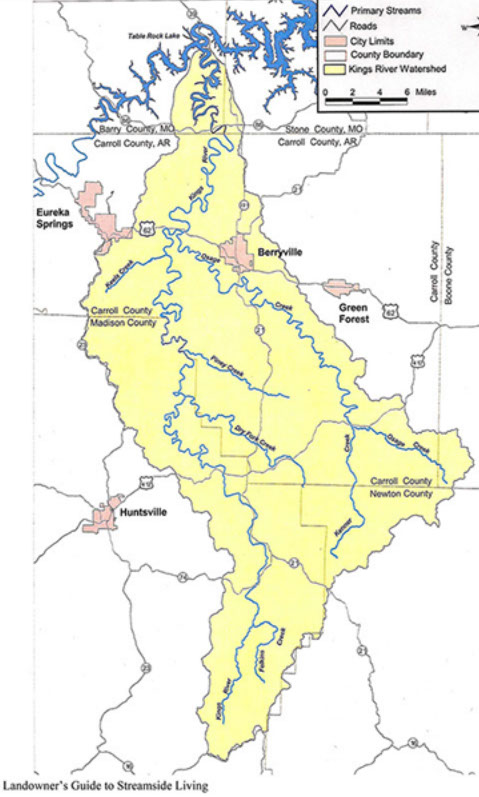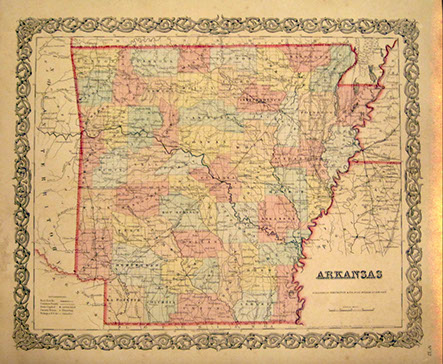
Membership water quality concerns evolved into the beginnings
of the process to create a voluntary watershed management plan...
 Mission Statement
Mission Statement
The Kings River Watershed Partnership, a non profit 501 (c)(3) organization founded in 2001, is "a cooperative effort, organized exclusively for charitable, scientific, and educational purposes; more specifically to protect the health, purity, and economic viability of the Kings River watershed, now and for future generations".
Membership
KRWP—who we are
The membership of KRWP includes local citizens from all walks of life who are interested in protecting the Kings River Watershed. Diversity of features in the watershed is a characteristic of the region and is reflected in the range of interests of the membership. Among the members there are property owners, small business owners, fisherman, poultry growers, recreational enthusiasts, farmers, cattlemen, conservationists, educators, retirees, and families that picnic, float, swim, and fish in the river and its tributaries. Membership is open to any individual, business, or organization that supports the mission of KRWP.
Board of Directors
The Board of Directors is elected by the general membership at the Annual Membership Meeting in January. Board members serve staggered three year terms of office. Some of the Board Members resign each year so that fresh ideas and perspectives are brought to the Partnership. Diversity of interests is required, so candidates for the Board are sought who can present opinions from:
• Agriculture
• Development and Real Estate
• Recreation
• Property owners
• Education and Scientific Research
• Conservation
• Small Business
• Industry
• Community
The board includes representation from Carroll and Madison counties in Arkansas.
 History of KRWP
History of KRWP
2001-2002
The Kings River Watershed Partnership began in December 2001 as a small affiliation of citizens and landowners concerned about possible declining water quality in the Kings River. This group of residents established a formal membership organization known as the Kings River Watershed Partnership in January 2002, with the assistance of the Arkansas Watershed Advisory Group.
A series of open public meetings were held during the next two years, in Carroll and Madison Counties, on issues impacting the Kings River included presentations on topics such as land development, municipal wastewater treatment, land application of nutrients, stream bank erosion, property rights, water quality testing, septic tanks, and urban impacts. Discussions on these issues generated a wide-ranging list of property owners’ concerns.
2003
Increased interest in these water quality issues and growth in membership led to the creation of a nine-member KRWP Board of Directors in March, 2003, followed by adoption of by-laws and incorporation in May of that year. The board was structured to ensure the representation of the many viewpoints of stakeholders living and working in the watershed. Official non-profit 501 (c)(3) tax exempt status was granted later in 2003.
A grant from the Arkansas Game and Fish Commission provided funding for a water monitoring test kit in 2003. A water quality testing program was developed beginning in December 2003 and has continued with monthly collection of chemical and physical measurements of several streams in the watershed. Trained volunteers follow strict protocols described in the Quality Assurance Project Plan, adopted in 2005 in conjunction with the Arkansas Water Resources Center at the University of Arkansas, the Upper White River Basin Foundation, and the EPA.
2004
Membership water quality concerns evolved into the beginnings of the process to create a voluntary watershed management plan that would give voice to residents determined to maintain local control over streams and develop specific actions to address perceived problems. A grant in July of 2004 from the Upper White River Basin Foundation, a non-profit group from across the state line in Missouri, funded a two-year watershed planner position, filled by watershed resident, Shawna Miller. Her task, at the direction of the KRWP board, was to create a voluntary watershed plan.
2005-2006
The Kings Roundtable, a series of 15 planning meetings involving over 60 watershed stakeholders during 2005, determined the water quality concerns, recommended restoration action strategies, and identified educational curriculum, monitoring programs, and voluntary land use measures for the plan. Watershed Plan.
The 87 page watershed plan, completed in 2006, is being used by KRWP to direct and prioritize its activities to improve water quality in the most economically efficient and environmentally effective way possible, within the scope of the partnership's mission.
KRWP received a grant of $1,525 from The Carroll County Community Foundation (CCCF) for the purchase of a Karst Modeling Kit. This kit will be used to demonstrate the fragile nature of the geology underlying the watershed to schools and community groups in educational programs beginning in 2007.
Tyson Foods generously donated $1,850 in November 2006 to support KRWP's water quality monitoring program.
2007
The annual membership meeting brought in three new members to the KRWP Board of Directors and an increase in new memberships, raising the total number of paid members to 176.
The Partnership contracted with Shawna Miller to write a “user friendly” publication based on the scientific and technical material gathered for the Watershed Plan.
2008
A grant from the Arkansas Natural Resources Commission launched a restoration project in the City of Berryville to rescue an urban stream that had become an eyesore. Mill Creek had degenerated into a storm runoff that could only get worse with time. Using volunteer help, donated resources and paid work from local contractors Mill Creek was restored to a Nature Habitat that is the heart of the Berryville recreation area.
2009
The First Edition of “Landowners Guide to Streamside Living” was published by the Partnership and widely distributed, free of charge, to educators, realtors, residents, river outfitters and city and county planners. This 42 page, full color publication was well received by river stakeholders.
2010- 2011
Board members taught a series of classes at local high schools on water ecology, based on the material written in the Watershed Plan.
2012
The first website for the KRWP was created. KRWP monitored the streambank restoration projects that were being conducted near Stoney Point and at Carroll County Road 329
2013
The bylaws of the Partnership were revised and updated to assure widespread representation of the community that we serve, protecting against diversion from its mission by any political, commercial or regional special interests.
2014
The first Facebook© was created for KRWP, allowing members and supporters to communicate with each other.
2015
Board members wrote a series of educational articles that were printed in local newspapers, related to care and conservation of the watershed.
A “Bug Kick” exercise was hosted for local school children, showing them how the health of a waterway can be determined by its resident wildlife.
2016
ADEQ de-listed the Upper Kings River from its “impaired” 303d list. KRWP has been submitting to ADEQ the test results from its regular water monitoring program.
The Board contracted with Shawna Milwagon (nee Miller) to revise and update the “Landowners Guide to Streamside Living”. Advertiser support was obtained to allow extensive, free distribution.
With funding from KRWP, Shawna taught classes on water ecology at local high schools.
A representative from The Nature Conservancy made a presentation to the KRWP AGM about their hopes and plans for wildlifeconservation, including a major streambank restoration project at Masons Bend.
2017
During the twice-yearly river clean-up that has been going on since 2003, the river team counted the 1,000th vehicle tire that had been hauled from the water.
At the AGM, the Director of the Arkansas Natural Heritage Commission explained their mission and purpose.
The Carroll – Boone Water District sent representatives to a Board meeting to explain their plans for a parallel water line that crosses the Kings River.
P.O. Box 961 | Berryville, AR 72616 | Phone: 870-480-8897 | Email: KRWP@kingsriverwatershed.org
Site Copyright © Kings River Watershed Partnership 2007-2023. All rights reserved.
Last Update April 2023